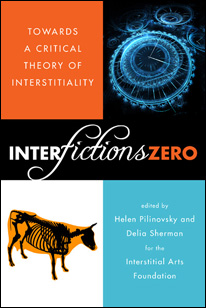
Interfictions Zero, edited by Delia Sherman and Helen Pilinovsky, is a rolling online anthology of interstitial criticism on interstitial texts. Every month, an original essay will go up on the Interstitial Arts Website, concerning some previously published piece of interstitial writing (hyperlinked where possible). The goal of Interfictions Zero is to begin to create a historical context for how interstitial writing affects the growth and development of various literary genres and to work towards a practical definition of Interstitiality.
What is Interstitial Writing?
Interstitiality isn't a genre, but many interstitial pieces have served as the seeds of new genres and sub-genres: myriad others besides continue as stand-alone works of genius. From Margaret Cavendish's The Blazing World to Lawrence Stern's Tristram Shandy, from Angela Carter's Wise Children to Gary Shteyngart's Super Sad True Love Story, interstitial writing challenges the expectations of genre and the assumptions of the common reader. The goal of the Interstitial Arts Foundation is to ask how, and why.
What Are We Looking For?
We're seeking original essays that examine key works of interstitial writing. The essays can be formal academic articles or more informal meditations on the texts of your choosing. In either case, we're interested in your take on intersititality and, most importantly, an analysis of how your chosen text illustrates it. The Interstitial Arts Foundation is currently engaged in the project of articulating a critical vocabulary suitable to the subject matter: terminology from various disciplines or of your own creation is acceptable and even encouraged.
What should you choose to examine in your essay? Our only requirements are that the text, work, or piece in question must have been published before 2010 and that it can be considered interstitial for the time in which it was written. Focus pieces can be from any genre or form, including but not limited to poetry, non-fiction, plays, graphic novels, movies, performance pieces, and works of fiction (contemporary realism, classical literature, mystery, historical, speculative, western, or otherwise).
If your essay is accepted for Interfictions Zero, it will join the queue of essays to be published on the Interstitial Arts website on the first of each month. As we get more submissions, and discern themes and connections between them, we may put up more than one essay in a month. Each month's essay will be featured on our blog. Past essays will be archived on the IAF web site.
Who Are We Looking For?
We're looking for writers and academics who have critical interpretations concerning works of interstitial writing that challenge genre tropes and expectations. If you've got an idea for an article that provides a cogent analysis of a text, but is too idiosyncratic for a standard academic publication, send it around.
Practical Matters
You may submit any time, but we will collect and read submissions beginning the 15th of every month. You will receive a response within one month. Electronic submissions only. Overseas submissions are welcome. Send your essays as Word or .rtf attachments to interfictions AT interstitialarts DOT org. You will hear from us by the first of the following month.
Submissions should include the title of your focus piece, a link to the subject or the pertinent bibliographical information, and your 750 to 3500 word essay examining how and why the focus piece is interstitial, practically, theoretically, generically, or otherwise.
No simultaneous or multiple submissions. Payment will be a $25 honorarium per essay for non-exclusive world anthology rights, payable upon publication.
Any questions? Write to us at interfictions AT interstitialarts DOT org! You can also download a flyer with additional details.
About the Editors
Delia Sherman was born in Tokyo, Japan, and brought up in New York City. She earned a PhD in Renaissance Studies at Brown University and taught at Boston University and Northeastern University. She is the author of the novels Through a Brazen Mirror, The Porcelain Dove, Changeling, and The Magic Mirror of the Mermaid Queen. A co-founder of the Interstitial Arts Foundation, she lives in New York City. More about Delia can be found on her profile page and at deliasherman.com. Her essay "An Introduction to Interstitial Arts: Life on the Border" can also be found on this website.
Helen Pilinovsky recently received her Ph.D in English and Comparative Literature from Columbia University, where she worked on issues of translation and genre formation in the realm of the fairy tale. Her dissertation is titled "Fantastic Emigres: Translation and Acculturation of the Fairy Tale in a Literary Diaspora". She is now an assistant professor at California State University, San Bernardino. Helen's reviews have appeared in Marvels & Tales: the Journal of Fairy Tale Studies and the New York Review of Science Fiction, and she has been published at the Endicott Studio for the Mythic Arts, in Realms of Fantasy magazine, and in a selection of academic journals. She has guest-edited issues of the Journal of the Fantastic in the Arts and Extrapolations, and she is the Academic Editor of Cabinet des Fees. Her interests include fairy tales, folklore, and the fantastic, as well as teaching, arguing literary theory, and silversmithing.

